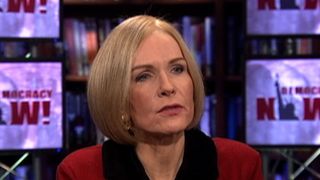
Topics
Guests
- Yves Smithfinancial analyst who founded the popular finance blog Naked Capitalism. She is the author of the book, ECONned: How Unenlightened Self Interest Undermined Democracy and Corrupted Capitalism.
In the largest banking settlement in U.S. history, the banking giant JPMorgan Chase is set to pay a record $13 billion fine to settle investigations into its mortgage-backed securities. Five years ago, the bank’s risky behavior helped trigger the financial meltdown, including manipulating mortgages and sending millions of Americans into bankruptcy or foreclosure. JPMorgan’s preliminary settlement with the U.S. government may end up costing much less after taxes — closer to $9 billion because the majority of the deal is expected to be tax-deductible. The deal is expected to be followed by a larger agreement with the Justice Department still in the works. Many in the media have portrayed the deal as unfair to the bank. The Wall Street Journal describes it as the government “confiscating” half of JPMorgan’s annual earnings to “appease … left-wing populist allies” of the Obama administration. Meanwhile, the New York Post portrayed it as a kind of bank robbery, running a headline that read: ”UNCLE SCAM: U.S. Robs Bank of $13 Billion.” We are joined by Yves Smith, financial analyst and founder of the popular finance blog “Naked Capitalism.” Smith is the author of the book, “ECONned: How Unenlightened Self Interest Undermined Democracy and Corrupted Capitalism.”
Click here to watch Part 2 of this interview.
Transcript
AMY GOODMAN: We turn to what’s being touted as the biggest banking settlement in U.S. history. The banking giant JPMorgan is set to pay a record $13 billion fine to settle investigations into its mortgage-backed securities. Five years ago, the bank’s risky behavior helped trigger the financial meltdown, including manipulating mortgages and sending millions of Americans into bankruptcy or foreclosure.
In a statement Friday night, JPMorgan called its latest settlement an “important step.” However, many in the media have portrayed the deal as unfair to the bank. The Wall Street Journal describes it as the government “confiscating” half of JPMorgan’s annual earnings to, quote, “appease … left-wing populist allies” of the Obama administration. Meanwhile, the New York Post portrayed it as a kind of bank robbery, running a headline that read, ”UNCLE [SCAM]: U.S. Robs Bank of $13 Billion.”
Well, to find out more, we’re joined by Yves Smith, financial analyst who founded the popular finance blog Naked Capitalism. She’s the author of the book, ECONned: How Unenlightened Self Interest Undermined Democracy and Corrupted Capitalism.
Yves Smith, welcome to Democracy Now! What’s your assessment of this settlement?
YVES SMITH: I’ve seldom seen a financial story where there’s been so much misreporting. For instance, the amount that’s going to be paid is still a bit in flux, but only $3 billion of that is actually going to be a fine. The overwhelming majority is for contract violations where the various banks, both JPMorgan itself and the two banks it acquired, Bear Stearns and Washington Mutual, did what amounted to promise investors that they were going to get steak, and instead it sold them hamburger—and, in fact, many times hamburger that was beginning to turn green. So, these claims are actually contract claims that are the liability something in the range of $200—or, sorry, $100 billion to $200 billion they’ll be getting rid of. That portion of the settlement is only going to be around $10 or 11 billion. So they’re getting out of that part at under 10 cents on the dollar. This is actually a screaming bargain.
AMY GOODMAN: Jamie Dimon called Eric Holder?
YVES SMITH: Yes. That was because—apparently, that’s because there was a—there is still in play that there may still be a criminal prosecution of the bank, not of individuals. There was a—the Department of Justice in California had been developing a case since 2007, and they—it was released in Reuters on—it was Monday, that they might be filing the criminal case as soon as Tuesday. And apparently Dimon called almost immediately, and they had a meeting on that Thursday. So it looks like it was the criminal suit that suddenly led to the desire to have some—
AMY GOODMAN: Should Jamie Dimon be indicted?
YVES SMITH: We don’t know enough to know anything. I personally think he should be indicted on the London Whale. I’ve said that a long time ago. So we just don’t know enough in this case what the facts are. And if—we may not know, if he manages to settle that one.
AMY GOODMAN: Where will the money come from? Shareholders? CEO bonuses? Will Jamie Dimon lose his job? This is the biggest settlement in U.S. history.
YVES SMITH: Right. Well, that’s another interesting part. First of this, so we’ve got, of this—now the numbers crept up, because the Federal Housing Finance Agency, they’ve actually been negotiating separately. Their deal went from $4 billion to $5.1 billion. But in any event, of that total, $4 billion of that isn’t even going to be in cash; $4 billion of the total settlement is in the form, homeowner relief. That can include things like short sales on securities that they sold, things the bank doesn’t even own. So—and we saw in the national mortgage settlement, the big one we had at the beginning of last year, that most of that has been things that really haven’t involved any real damage to the banks. The portion that’s paying for the hamburger instead of steak part is going to be tax-deductible. And it looks like there’s another fight that’s going on between the Department of Justice and JPMorgan, that they may be able to put $1.1 billion of that total amount to the FDIC. So the actual number that JPMorgan is going to wind up paying is vastly smaller than this number that’s being bandied about.
AMY GOODMAN: Yves Smith, we have to stop this conversation here for the end of the show, but we’ll continue it online, and we’ll post it at democracynow.org. Yves Smith, financial analyst who founded the popular finance blog, Naked Capitalism, author of ECONned.












Media Options